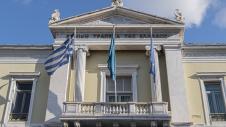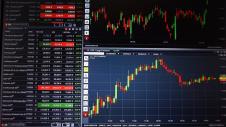Greek bank shares are returning to levels not seen since the sector's third round of recapitalizations took place in 2015, while 2020 looks like it will be the year when big improvements to their balance sheets are seen.
Bank shares may be back at the forefront this year, rising 100 percent on an annual basis, but they continue to trade at prices below rights issues completed in 2015 as part of the third recapitalization plan. Prices that had been shaped ahead of Greece's near euro exit, the imposition of capital controls, a rock bottom country investment grade, a 12-year low in bank deposits and record high bad loans.
Today, more than four years later, only National Bank of Greece's shares have risen above 2015 levels (0.3 percent) while Alpha Bank shares are 6 percent lower and Eurobank and Piraeus Bank stocks are down 10.2 percent and 48.9 percent respectively.
Despite improved economic conditions in Greece and higher optimism on the back of the July elections victory by conservatives New Democracy, bank shares remain stuck at low levels, reflecting the massive challenges faced by the sector.
The large stock of bad loans and deferred tax credits (DTCs) that form part of their capital base are two key concerns for investors. Problems that many in 2018 believed could not be solved and this triggered speculative selling pressure, pushing the banking share index on the Athens bourse down to 281 points at the start of 2019.
A large turnaround came as the start of the year with the Asset Protection Scheme, later to be called the Hercules plan, put together by the Hellenic Financial Stability Fund and the Bank of Greece's ambitious proposals that tackle non-performing loans (NPLs) and DTCs held by lenders. These two plans, along with steps by each bank to offload NPLs, drove bank stocks higher. Players that took short positions on bank shares, betting that prices would drop, incurred significant losses.
In recent days, bank shares have kept moving higher with the sector's index hitting a new year high on the Athens bourse even though there are still no specific details out on the Hercules plan. On the contrary, sources indicate that significant technical details on the proposal are outstanding, while the government appears to have shelved the Bank of Greece plan.
Investors appear to be ignoring any technical problems arising on the Hercules plan, which aims to reduce bad loans by up to 30 billion euros with state-backed securitizations, indicating strong confidence in the sector. This comes at a time when European authorities (European Commission and European Central Bank) are open to supporting non conventional ways to help Greek lenders offload NPLs. Bank officials will be able to get a better picture of the Hercules plan once legislation on the proposal has been prepared.
As Greece's economy and banks return to normal, it is reasonable to expect bank shares to head higher, and move closer to levels seen in Europe, where they currently trade at a discount of 15 percent of book value and not at a discount of 60 percent, as is the case in Greece right now.









